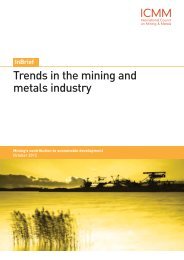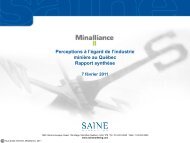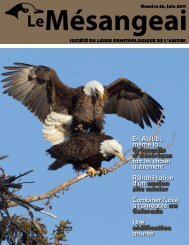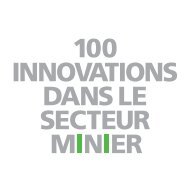Create successful ePaper yourself
Turn your PDF publications into a flip-book with our unique Google optimized e-Paper software.
Welcome to PwC’s eighth annual review of global trends in the mining industry—<strong>Mine</strong>. <strong>The</strong>se reviews<br />
provide a comprehensive analysis of the financial performance and position of the global mining<br />
industry as represented by the Top 40 mining companies by market capitalisation.<br />
Last year we highlighted the growing optimism in the mining<br />
industry and demand fundamentals that were driving the<br />
industry back to boom times. <strong>The</strong> 2010 results have delivered<br />
on this expectation, but it is clear that the <strong>game</strong> <strong>has</strong> <strong>changed</strong>.<br />
<strong>The</strong> mining industry <strong>has</strong> entered a new era. Demand<br />
continues to be stoked by strong growth in emerging<br />
markets. Supply is increasingly constrained, as development<br />
projects become more complex and are typically in more<br />
remote, unfamiliar territory. <strong>The</strong> cost base of the industry<br />
<strong>has</strong> permanently <strong>changed</strong> as lower grades and shortages of<br />
labour take effect.<br />
To keep up with demand, the Top 40 have announced more<br />
than $300 billion of capital programs with over $120 billion<br />
planned for <strong>2011</strong>, more than double the total 2010 spend.<br />
While not all will be completed, the sheer size and volume of<br />
the announced capital projects demonstrates an industry<br />
where fulfilling seemingly insatiable demand is the top priority.<br />
In 2010, despite tones of cautious optimism from CEOs and<br />
short-term fluctuations in the market caused by instability<br />
across many areas of the globe, the financial results for the<br />
Top 40 were spectacular:<br />
• Revenues increased 32% – breaking $400 billion for the<br />
first time<br />
• Net profit was up 156% to $110 billion<br />
• Operating cash flows grew 59%, leaving more than $100<br />
billion cash on hand at year end<br />
• Total assets approached $1 trillion<br />
• Net debt reduced to $46 billion, resulting in gearing of<br />
only 8%<br />
However, while commodity prices have increased the<br />
margins achieved in the past year are still below the highs of<br />
2006 and 2007.<br />
Investment in new supply is increasingly focused on emerging<br />
markets, and by new faces, as customers and governments<br />
enter the industry with the primary goal of securing supply.<br />
Vertical integration into mining by customers that prioritise<br />
certainty of supply over cost, will bring additional supply<br />
online from non-Tier one assets. <strong>The</strong> cost curve <strong>has</strong> shifted<br />
and commodity prices have permanently moved higher.<br />
Production for 2010 increased by 5% overall with the<br />
benefits of expansion through the global financial crisis being<br />
realised by those who continued to invest through the cycle.<br />
Emerging markets continue to change the face of the mining<br />
industry. One sign is the average Total Shareholder Return<br />
(TSR) of companies from emerging markets in the Top 40<br />
more than doubling the return from the ‘traditional’ mining<br />
countries over the past four years.<br />
Overall the market capitalisation <strong>has</strong> increased by 26%.<br />
While some have expressed concern that the market<br />
capitalisation of the industry <strong>has</strong> increased too fast and too<br />
much; the jump is attributable largely to balance sheet<br />
growth following 2010’s stellar results.<br />
<strong>The</strong> outlook expressed by industry leaders is increasingly<br />
positive, with companies taking definitive action on capital<br />
projects, as well as mergers and acquisitions. In a view from<br />
the top, the CEOs note their continuing belief in emerging<br />
markets, particularly the ongoing growth in China and the<br />
nation’s ability to achieve or exceed the 7% growth target<br />
outlined in the 12th Five Year Plan. Resource nationalism<br />
and stakeholder management occupy a higher degree of<br />
attention from the CEOs, as does the ever increasing<br />
complexity and sophistication in the industry.<br />
With mining continuing to climb up the political priority list<br />
at a time of budget deficits and changing economic and social<br />
priorities, many governments are looking at reforms to their<br />
mining codes, grappling with sustainability issues and<br />
revisiting their approach to taxation and royalties. In what’s<br />
mine is mine we are joined by Eurasia Group, which <strong>has</strong><br />
provided an overview of a number of the key drivers for these<br />
trends in light of a growing focus on corporate transparency<br />
and the interplay between corporates and society.<br />
<strong>The</strong>se are interesting times for the mining industry, with ever<br />
increasing scrutiny from governments, customers and other<br />
stakeholders. Growing demand for its products, driven by<br />
emerging markets, highlights that supply will be the most<br />
significant challenge it will face. <strong>The</strong> shift in balance is a<br />
positive one for the mining industry, but it will not be simple<br />
and will take some managing. All of this highlights that the<br />
<strong>game</strong> <strong>has</strong> <strong>changed</strong>.<br />
We trust you will find this year’s publication informative and<br />
encourage you to send us your feedback.<br />
Tim Goldsmith<br />
PwC Global Mining Leader<br />
<strong>Mine</strong> Project Leader<br />
<strong>Mine</strong>–<strong>The</strong> <strong>game</strong> <strong>has</strong> <strong>changed</strong> 1









